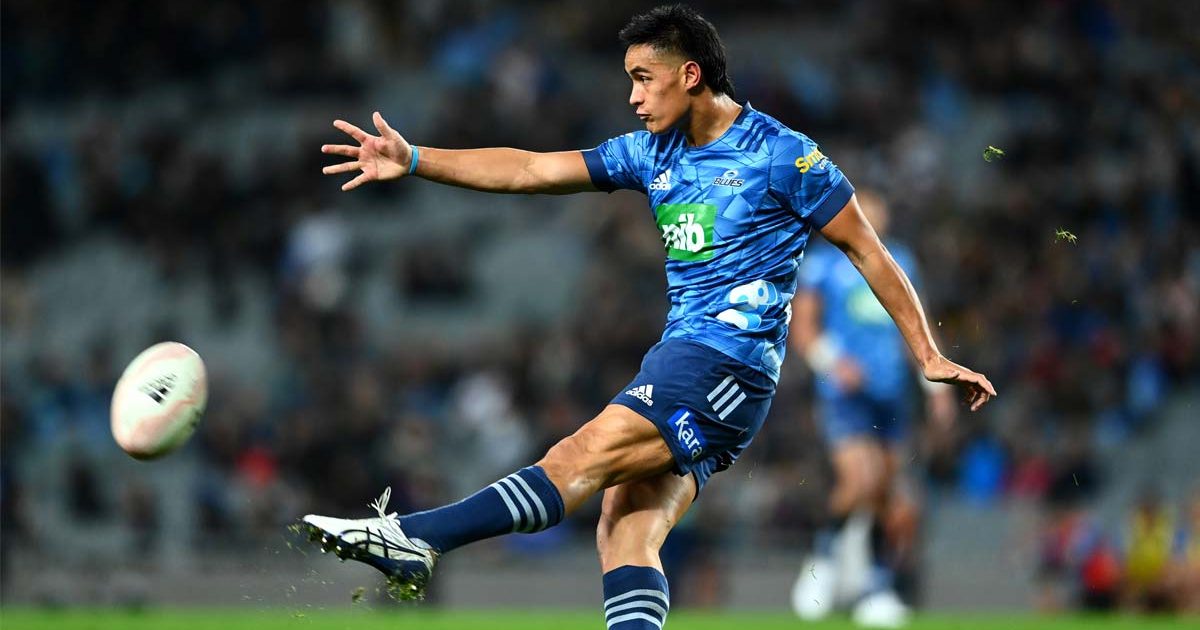Zarn Sullivan's breakout campaign with the Blues finishes with a flourish as the young fullback draws Beauden Barrett comparisons

Before the Super Rugby Aotearoa season kicked off, many fans were curious how Blues coach Leon MacDonald would utilise new utility back Zarn Sullivan.
The 20-year-old was a standout performer for Auckland last year in his first full-time season with the province but spent his formative years at first five for King’s College. With the likes of Otere Black, Harry Plummer and Stephen Perofeta on the books, however, there weren’t exactly vacant positions in the matchday 23 for Sullivan to fill.
Still, the youngster boasted enormous potential and many expected to see Sullivan rushed straight into the action.
MacDonald, himself a former All Blacks fullback, took a more conservative approach – not handing his charge a Super Rugby debut until the Blues’ final game of their Aotearoa campaign, a dead-rubber match with the Chiefs.
Sullivan wore the No 15 jersey for that game in place of regular fullback Perofeta and the 20-year-old looked right at home – though was admittedly lining up against an inexperienced Chiefs lineup.
What a way to sign off your career with the @BluesRugbyTeam ? #SuperRugbyTT #BLUvHIGhttps://t.co/W1p1OVFplO
— RugbyPass (@RugbyPass) June 19, 2021
He finished the game with a well-taken try – courtesy of his handy turn of pace – but it was his kicking game that was most impressive, keeping the Chiefs back three honest and minimising opportunities for easy metres on the counter-attack.
When Super Rugby Trans-Tasman kicked off two weeks later, Sullivan retained his spot against the Rebels and hasn’t looked back since, starting the remainder of the Blues’ matches, including Saturday evening’s Super Rugby Trans-Tasman final victory.
MacDonald was impressed with the performance put on by his young fullback, with Sullivan again peppering kicks in behind the Highlanders outside backs to minimise the opportunities handed to danger men like Jona Nareki and Josh Ioane.
That’s especially important for the Blues, whose forwards are some of the bigger players in the competition, which naturally comes at the cost of some mobility.
“Zarn has been doing a little bit of what Beauden [Barrett] was doing for us last year with his left foot and having kicking options for us,
MacDonald said.
“It’s an important part of our game, getting that kick balance right, because of our big men. We can’t ask them to defend, then ask them to scrum, then ask them to tackle their hearts out and then we can’t run them around by chucking the ball everywhere. Zarn’s been really good in that space.”
In 2015, the #AllBlacks had the luxury of picking from the likes of Dan Carter, Aaron Cruden, Beauden Barrett, Lima Sopoaga, Colin Slade and Tom Taylor to wear No 10. That luxury is long gone – but perhaps a new dawn is approaching.
?? Tom Vinicombehttps://t.co/uLpGoZ3Puj
— RugbyPass+ (@RugbyPassPlus) March 4, 2021
For a gauge on how important Sullivan’s role is to the side, just look to Highlanders co-captain Ash Dixon, who acknowledged that a big factor in the final result was the Blues’ dominant field control.
“Our territory wasn’t quite right tonight,” he said following the match. “We didn’t quite get in there and Zarn Sullivan and the other boys were putting it behind us a lot and had a great kicking game.”
It’s one thing for an experienced player to take a big game by the scruff of the neck, but it’s another entirely for a 20-year-old to do the same.
MacDonald also acknowledged one big advantage that Sullivan has over teammate Perofeta – his sizeable frame.
“He’s been physical – I thought our back three’s actually become one of the more physical back threes in the comp,” MacDonald said. “Bryce [Heem], in particular, has lead the way there and Mark’s come back after being dropped, he’s come back and brought a real edge.
“[Sullivan] is a 100kg fullback who’s strong in the tackle as well. It’s so pleasing to see young guys like that step up in the big time and he’s enjoying himself and he’s got a lot to offer. He’s just starting really.”
While regular first five Otere Black is now heading overseas, Sullivan is likely to remain at fullback in 2022 thanks to the return of Beauden Barrett, who’s spent the season on sabbatical in Japan.
Code-hopper Roger Tuivasa-Sheck is also joining the outfit next season and could slot in across the backline but MacDonald is confident that Sullivan will continue to develop in the No 15 jersey and that 2021 is just the beginning for the youngster.
“We’ll keep him at the back at the moment,” the coach said. “We’ve obviously got Beaudie there and Oates is going but Stephen Perofeta is playing good rugby and you saw Harry [Plummer] step up to the mark so we’re pretty blessed with some good depth at 10.
“And at the moment, I think, just nailing one job at the moment. And I think he’s got the attributes to become a very good 15. I see the skillset’s perfect and he just keeps growing in confidence and understanding, there’s no reason why he couldn’t become a 15 full-time.”
Sullivan and Plummer will both link up with Auckland for the upcoming NPC season and will likely operate as a playmaking duo, in a similar vein to Sullivan’s combination with Black at the Blues.











































































